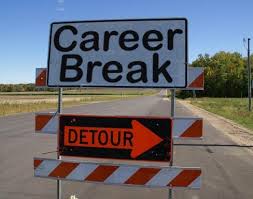Are there times when you wish you could take a break from your work life? Worried how things will pan out financially if you do!
 There comes a time in one’s professional life when you want to stop and take stock; sometimes this may be necessitated due to personal circumstances. You may wish to take a break to spend time with your teenage son, prepare and support your child for his board exams or have a baby and see it through the initial years. Or you may decide to pursue a degree, invest in alternate skills or just take it easy after a long and highly stressful stint at work. Irrespective of the reason for the break, there are number of things to be considered before such a step. While one aspect is professional – how would this affect your career graph in the long run, would it be easy to resume where one left off, what about the opportunities lost and so on. The other aspect is the financial implications of such a decision.
There comes a time in one’s professional life when you want to stop and take stock; sometimes this may be necessitated due to personal circumstances. You may wish to take a break to spend time with your teenage son, prepare and support your child for his board exams or have a baby and see it through the initial years. Or you may decide to pursue a degree, invest in alternate skills or just take it easy after a long and highly stressful stint at work. Irrespective of the reason for the break, there are number of things to be considered before such a step. While one aspect is professional – how would this affect your career graph in the long run, would it be easy to resume where one left off, what about the opportunities lost and so on. The other aspect is the financial implications of such a decision.
Let me give you an insight into the financial implications so that you can plan your break and be at peace of mind.
First, take stock of the amount you contribute to the monthly living expenses and the savings of your family. Second, look at your household budget. Revise it assuming you are not working any longer – this could mean some changes in expenditure like increased electricity costs, lower conveyance expenses or increased costs in terms of education fees if you are pursuing a course. Now check if the household budget can still be met without your monthly contribution; with your accumulated savings and your spouse’s earnings alone? If you are single, then you have to depend only on your accumulated savings for your living expenses while you are on a break.
In short do you have a corpus to fund your break?
This step will help you decide the timing of your break. If you find that yes, your living expenses can be managed without your salary, then go ahead and take that break!! If the answer is no, then you will need to calculate the additional time period that you have to continue working in order to create a corpus to be used in place of your regular earnings. This could be anything from a few months to a year depending on the corpus to be built. This break can also often be worked on considering a hike due in your spouse’s earnings.
Irrespective of when you plan to start your break or how long your break lasts, you must consider the following:
- In the event of a clean break from your workplace, you will need to withdraw your EPF. As per the EPF rules, if there is no contribution to the account for 36 months, the account becomes inoperative and no interest gets paid on it. The balance in your EPF amount, accumulated over your work life could be a substantial amount! So leaving this amount without earning any interest is a financial folly. You could use this to support your break but that may not be the best idea. EPF fund was for your retirement! – So use it for your goals. You may put this in investments that provide monthly returns to help make up for the loss of your monthly income or back in long term investments towards your retirement goal.
- Watch your expenses and spend prudently with a view to strengthen the corpus required to fund your break. This attitude needs to continue during the break also as the corpus needs to last till you are ready to go back to work.
- Take the help of a financial planner to determine, how this break would affect your long term goals such as owning your own house, marriage, children’s education etc. Say, you had earmarked your EPF fund for a loan to be used to buy a house, which may now have to re-looked at, since the accumulation in the EPF account will stop temporarily.
- Take corrective measures – depending on your situation this could mean moving some of your investments; postponing/reducing some goals, or minimising monthly expenditure.
- Last but not the least, ensure that you have medical insurance taken independently. The norm today is that medical insurance for you and your family is a part of the package offered to you by your employer. Hence when you stop working, this cover also lapses, and if any medical emergency arises during your break, you are left without protection. So get that cover today and start planning your time off!
If you have the financial implications sorted out, I am sure you can easily chart out your much needed break. Remember you only live once so make the most of it! Just know your finances in advance!



![Life Contingencies – Are you prepared? [Part II]](https://gurgaonmoms.com/wp-content/uploads/2014/03/howmuch.png)
